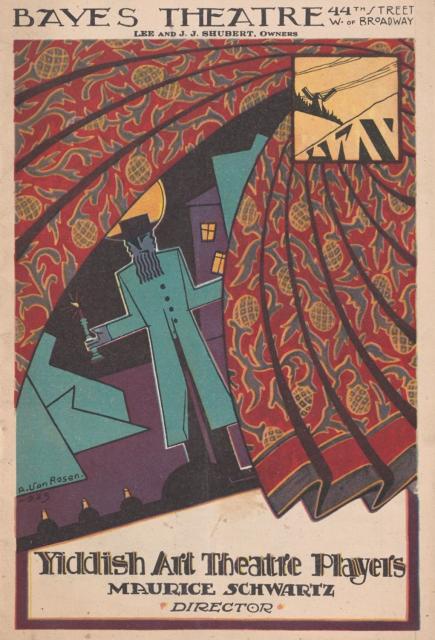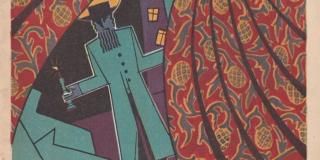
Robert Van Rosen, 1904–1966 (Artist)
A shnirele perl: drama in 4 aḳṭen (A String of Pearls: A Drama in 4 Acts)
Sholem Asch (Author); Maurice Schwartz (Director); Yosef Foshko (Set Designer)
New York: Yiddish Art Theatre Players, 1925
Building Jewish Life in the United States
The Dorot Jewish Division houses an impressive Judaica Americana collection and stands as one the most robust repositories of such materials in the United States. Its holdings allow for comprehensive exploration of the development of the Jewish community in the United States. The Library’s archival and printed materials illuminate the ways in which emigré Jews have contributed to commerce, charity activities, intellectual pursuits, and cultural life after establishing new lives in the United States. Included are examples dating to the 18th century—for example, a Hebrew grammar book and Jewish merchants’ business correspondence—as well as documents from the early 20th century with a specific focus on New York City, such as those that demonstrate the Educational Alliance’s efforts in assisting immigrants in reestablishing their lives. This diverse collection features a variety of materials, including citizenship guides, maps, handwritten synagogue records, manuscripts, music scores, theater programs, and illustrated essays, as well as unique materials from the New York World’s Fair of 1939–40, and preserved copies of rare Yiddish, Hebrew, and Ladino periodicals.
The assortment here also highlights several amusing and unique advertising items, including trade cards and matchboxes that preserve the last remaining traces of once-thriving Jewish restaurants, businesses, and organizations. These materials capture the bustling atmosphere of early Yiddish theaters and English-language Jewish plays, while shedding light on the stories behind the performances and the personalities of the playwrights, actors, and artists. Examples of the Jewish press showcased in the exhibit reflected the pressing issues of social justice and laborers’ rights in the United States at the turn of the 20th century, while also featuring advertisements for the upcoming theater performances and new publications, and promoting opportunities for the immigrants. In addition, this section underscored the role the United States played in providing safe haven for distinguished Jewish intellectuals during times of conflict, including legendary Hebrew lexicographer Eliezer Ben-Yehuda (1858–1922), who conducted research at the Library during World War I.






